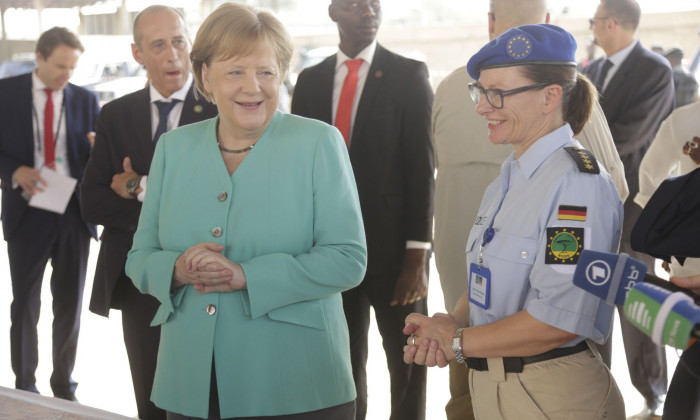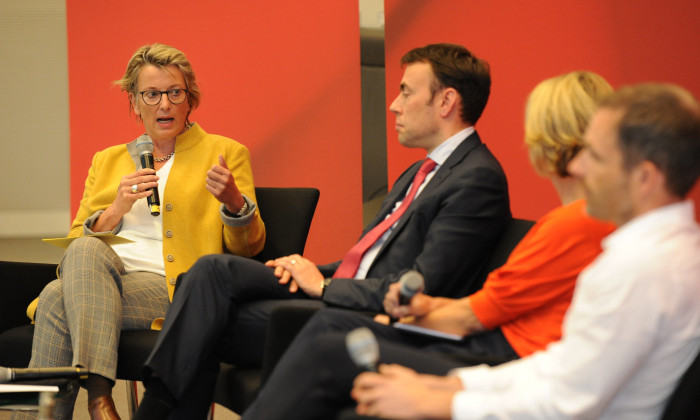Our Tasks
ZIF provides “one-stop” services and expertise on peace operations integrating training, the secondment of German civilian personnel, international capacity development, research and analysis under one roof.
Our mission
The Center for International Peace Operations was established in 2002 by the Federal Government of Germany and the German Parliament to strengthen international civilian capacities for crisis prevention, conflict resolution and peacebuilding. It is a non-profit limited liability company, whose sole shareholder is the Federal Republic of Germany, represented by the German Federal Foreign Office.
On behalf of the Federal Foreign Office, ZIF provides services and expertise on and for peace operations at the national and international level in a comprehensive approach that unites training, recruitment, deployments, policy advice, analysis, international capacity building and dialogue formats.
We are actively engaged in various areas:
- We train civilian experts for peace operations, humanitarian operations and election observation missions. Together with partners, we seek to advance curricula, training methods and training standards.
- For peace operations, humanitarian operations and election observation missions, we recruit and second German civilian personnel. As the employer of German civilian personnel in these operations, we are fully committed to our duty of care obligations before, during and after deployment.
- We manage the ZIF Expert Pool to facilitate the deployment of pre-qualified and pre-selected personnel to missions at short notice. Over 1,400 qualified and experienced experts in the ZIF Expert Pool are available for assignment in a broad range of professional areas.
- We offer analysis, information and policy advice on all aspects of peace operations. Through policy relevant research, dialogue and exchange, we contribute to the conceptual debate and the development of peace operations.
- We advise international organisations, their member states and peace operations on developing their civilian capacities, and promote the exchange and transfer of knowledge between relevant agencies.
In carrying out our mandate, we work closely with the Federal Foreign Office (AA), the Federal Ministries for Economic Cooperation and Development (BMZ), of the interior (BMI) and Defence (BMVg), as well as with international organisations such as the UN, the EU and the OSCE.
The deployment of German civilian experts to international peace operations is regulated by the so-called Secondment Act.
In accordance with the Secondment Act, passed by the German Bundestag in 2017, ZIF is the employer of German civilian experts seconded to peace operations, humanitarian missions and long-term election observations.
"ZIF has 20 years of practical experience and a top-class network of international partners. Both together enable us to think ahead and develop foreign and security policy around multilateral peace operations“
 ©EUCAP Sahel Niger/Barbara Kreutzer
©EUCAP Sahel Niger/Barbara Kreutzer
Our Principles: Multilateral Cooperation and the Comprehensive Approach
ZIF stands for working together with partners – both at national and international levels. International cooperation plays a central part in our work, as reflected in our training, research and dialogues, and in secondment of civilian experts to the field. In the process, we build bridges between civilian, military, police and development actors. This comprehensive approach – a key principle in peace operations themselves – is a cornerstone of our work in Germany and abroad.

ZIF is a subsidiary of the Federal Government of Germany, represented by the Federal Foreign Office, and was established in 2002.
Further information about what we do is available here.
How is our organisation structured
Management
ZIF's management consists of the executive director, the deputy director and the head of administration.
Together with all ZIF teams - Human Resources, Policy, Partnerships & Innovation, Training, Public Relations, Security Management, Legal Affairs and Secondment Management, Finances and Internal Administration and IT & Facility Management - they implement ZIF's mandate.
Teams
Human Resources (HR)
The HR Team carries out the tasks of recruiting, deploying and managing the civilian experts for peace operations. The team is responsible for selecting experts for the ZIF Expert Pool, managing the ZIF Expert Pool as well as recruiting and supporting civilian personnel before, during and after a peace operation.
Team Policy, Partnerships & Innovation (PPI)
Impact through knowledge generation and transfer
In the new Policy, Partnerships & Innovation (PPI) team, ZIF is pooling its expertise in the areas of analysis, advice and capacity development. PPI considers itself to be an ‘innovation generator’ and actively works on developing new areas of activity and partnerships. We provide concrete contributions to improving multilateral conflict and crisis management, with a particular focus on peace operations, humanitarian aid and peace mediation.
Training
Peace operations demand specific qualifications and skills. With its innovative, integrated and practice-oriented courses, the Training Team prepares experts for their work in missions and facilitates quality assurance and the further development of training measures at national and international level. The contents of the training courses are oriented toward the qualification needs of participating international organisations. We also consult on and carry out tailor-made training courses for other clients, while in-mission training courses are held on site during the operations themselves.
Public Relations
The Public Relations team is responsible for ZIF's communication and external image. In order to present our services and expertise in the fields of crisis prevention, conflict resolution and peacebuilding in an informative, appealing and understandable way, the team uses digital “showcases” such as the ZIF website, communication channels such as LinkedIn, Bluesky and X (formerly Twitter) or our newsletters as well as classic formats such as information products, publications, events and trade fair appearances - all in our corporate design.
Our history in five dates
In October 1998,
the OSCE participating states deployed a nearly 1,500-person peace operation to Kosovo with the objective of monitoring the cessation of hostilities. The Federal Government of Germany agreed to deploy 200 civilian observers. However, the recruitment of suitably qualified personnel proved to be difficult, as Germany had no central focal point for the participation of civilian personnel in such operations at the time. At the same time, the German Government sought to strengthen crisis prevention and the capabilities of international organisations. A feasibility study by Dr. Winrich Kühne that focused on bolstering civilian capacities for peace operations, and the subsequent establishment of a corresponding organisation, marked the beginnings of ZIF.
On 22 June 2002,
ZIF was established as a non-profit limited liability company (gGmbH), with Dr. Winrich Kühne as its Executive Director and a total of 17 full-time staff positions. ZIF’s first basic course was held in the summer of 2002. Within four years, the pioneering ZIF Expert Pool had grown to a capacity of 1,000 experts. As more and more countries showed an interest in building comparable civilian capacities, ZIF was able to utilize its own institutional experience to provide valuable advice and support in this area.
In September 2009,
Dr. Almut Wieland-Karimi took over as Executive Director of ZIF.
In 2014,
three experts seconded by Germany were seriously injured in a bomb attack in Djibouti. Questions about duty of care obligations for seconded staff led to a restructuring and an adjustment of ZIF’s tasks, as well as to an amendment of Germany’s Secondment Act (SekG).
In 2017,
the German Parliament passed the revised version of the Secondment Act, which significantly improved the situation with regard to the legal terms of employment, as well as benefits, for seconded staff. ZIF became the seconding institution and employer of German civilian experts seconded to peace operations. For ZIF, this meant a substantial increase in terms of responsibility and associated tasks, and an important step toward ensuring duty of care and competitiveness in the labour market.
Dr. Astrid Irrgang has been Executive Director of ZIF since June 2023. She had already taken over the position ad interim from her predecessor Dr. Almut Wieland-Karimi on September 1, 2022.
Also in the year 2025
ZIF will continue to be the central civilian actor for German multilateral crisis management. With 60.5 permanent positions and an average of 20 additional colleagues (temporary or project staff) at our Berlin headquarters, we deploy an average of 180 seconded personnel and around 300 election observers to international missions each year. Training and mission preparation are part of our mission statement. We also use our operational knowledge to advise political decision-makers and promote international capacity building with numerous formats and measures. We are expanding our international network in a targeted manner.
Deployments are constantly evolving - ZIF thinks ahead. Innovative solutions and future topics as well as new methods and standards characterize our work in all areas. In 2025, for example, the focus will be on climate security, the nexus between humanitarian aid, development cooperation and peacebuilding (HDP Nexus) and peacebuilding.
Sustainability is important for us at ZIF. With the introduction of new IT solutions, for example, we have made good progress toward a paperless working environment. We consider environmental and social criteria in the purchase of office supplies and the production of ZIF publications. We opt for train travel for our business trips within Germany and to avoid flights – wherever possible - to European destinations, too. In our substantive work, we seek to strengthen and streamline issues of climate change and environmental protection and their interface with peace and security.